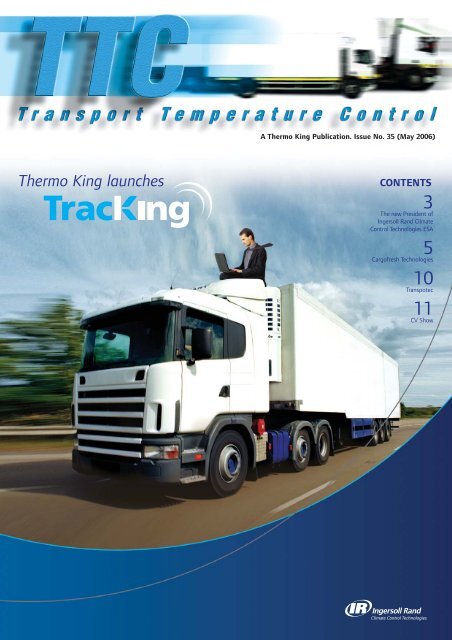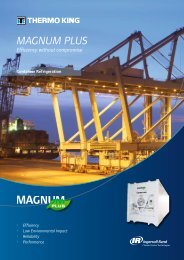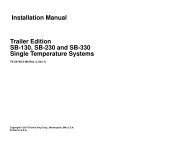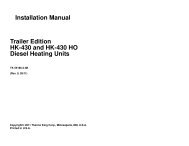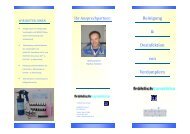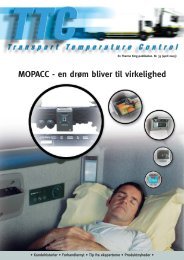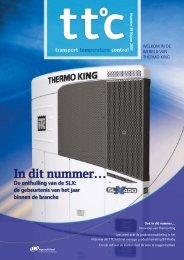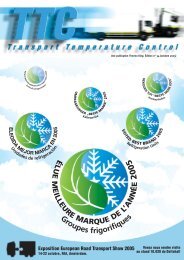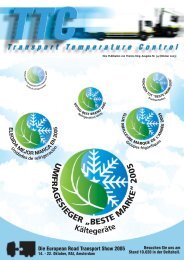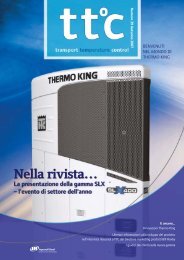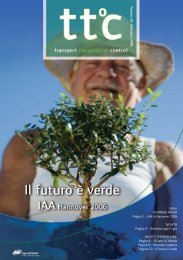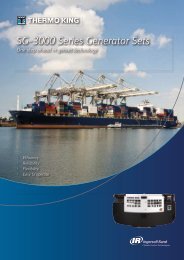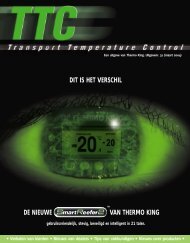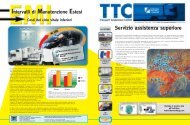The New President Of Ingersoll Rand Climate Control - Thermo King
The New President Of Ingersoll Rand Climate Control - Thermo King
The New President Of Ingersoll Rand Climate Control - Thermo King
You also want an ePaper? Increase the reach of your titles
YUMPU automatically turns print PDFs into web optimized ePapers that Google loves.
<strong>The</strong>rmo <strong>King</strong> launches<br />
A <strong>The</strong>rmo <strong>King</strong> Publication. Issue No. 35 (May 2006)<br />
CONTENTS<br />
3<br />
<strong>The</strong> new <strong>President</strong> of<br />
<strong>Ingersoll</strong> <strong>Rand</strong> <strong>Climate</strong><br />
<strong>Control</strong> Technologies ESA<br />
5<br />
Cargofresh Technologies<br />
10 Transpotec<br />
11 CV Show
<strong>The</strong>rmo <strong>King</strong>’s committment to lowering<br />
operational costs<br />
“We can also<br />
contribute to<br />
lowering your<br />
operating costs<br />
by providing you<br />
with tools for<br />
better fleet<br />
management”<br />
3 TTC Q2 April 2006<br />
<strong>The</strong>rmo <strong>King</strong> asks the hard questions in a bid to give our<br />
customers equipment of the highest standard.<br />
At <strong>The</strong>rmo <strong>King</strong> we are acutely aware that you,<br />
our customers, are facing rapidly growing<br />
operating costs: MAUT-like road taxes,<br />
increasing fuel prices, the application of the<br />
European Working Hours Directive, to mention<br />
but a few. You also need additional investment<br />
in your business, like the generally more<br />
expensive vehicles with Euro IV engines and,<br />
soon to come, Euro V engines, or the<br />
requirement for digital tachometers.<br />
We are firmly committed to supporting your<br />
business by helping lower your operating costs.<br />
And we can do it by producing the most fuelefficient<br />
and the most reliable refrigeration<br />
units. Reliability quickly translates into less<br />
ALBERTO ROUCO<br />
Vice <strong>President</strong>, Marketing and Business Development.<br />
maintenance cost and, equally important, less<br />
unplanned downtime for your vehicles. Time<br />
and again, we have run live tests demonstrating<br />
the superior economy of our products. With fuel<br />
costs likely to exceed 50% of your total costs of<br />
operation and ownership, fuel savings as high as<br />
30% must be really good news. Our equipment<br />
provides the tightest temperature control to<br />
guarantee that your cargo is safely preserved<br />
in ideal conditions.<br />
We can also contribute to lowering your<br />
operating costs by providing you with tools for<br />
better fleet management, like the new Trac<strong>King</strong><br />
communication system that we are introducing<br />
in this issue of TTC. <strong>The</strong> new Trac<strong>King</strong> will<br />
communicate to your fleet management centre<br />
in real time, if you need it, the cargo<br />
temperature, the refrigeration unit condition and<br />
the vehicle position, thus allowing better control<br />
of your vehicles and quicker reaction to any<br />
problem that may occur. <strong>The</strong> use of GPRS<br />
technology makes the cost of this<br />
communication very affordable compared to the<br />
benefits it brings to you.<br />
On a different subject, environmental protection<br />
is finally getting the public attention that it<br />
deserves. <strong>The</strong> entire refrigeration and HVAC<br />
industry is seriously looking at more<br />
environmentally friendly systems. And once<br />
again, <strong>The</strong>rmo <strong>King</strong> is well ahead, not just<br />
through the superior efficiency of our<br />
conventional units, but particularly through our<br />
cryogenic refrigeration alternatives for trucks<br />
and trailers. This exclusive <strong>The</strong>rmo <strong>King</strong><br />
technology is HFC free and uses CO2 in an open<br />
loop circuit as refrigerant. Our cryogenic units<br />
have been available in the market for over five<br />
years now. You can find out more about these<br />
units in this TTC issue. In Germany, Austria and<br />
Switzerland we are currently using a Demo<br />
truck to show our customers at first hand the<br />
convenience of our cryogenic units.
Q2 2006 APRIL<br />
<strong>New</strong> <strong>President</strong> for <strong>Ingersoll</strong> <strong>Rand</strong> <strong>Climate</strong> <strong>Control</strong><br />
Technologies for ESA (European Served Area)<br />
<strong>Ingersoll</strong> <strong>Rand</strong> <strong>Climate</strong> <strong>Control</strong> Technologies for<br />
ESA is under new management. Didier Teirlinck<br />
has been appointed as new president of the<br />
company, made up of <strong>The</strong>rmo <strong>King</strong>, the global<br />
leader in transport temperature control, and<br />
Koxka and Hussmann, leading manufacturers of<br />
refrigerated display merchandisers.<br />
Didier replaces former president Richard Pedtke<br />
and joins <strong>Ingersoll</strong> <strong>Rand</strong> from Volvo Construction<br />
Equipment, where he was the global president of<br />
Compact Business, based in Brussels, Belgium.<br />
Didier has an Engineering Degree from Nancy,<br />
France and a PhD in Metallurgy from Hamilton,<br />
Canada and has worked in a variety of roles.<br />
<strong>The</strong>se include engineering for manufacturing<br />
operations and general management.<br />
His leadership and international experience, with<br />
special emphasis in business turn-around and<br />
business development, will be an asset to the<br />
<strong>Climate</strong> <strong>Control</strong> Technologies division of <strong>Ingersoll</strong><br />
<strong>Rand</strong>. In his new role Didier Teirlinck will continue<br />
to grow and develop the almost $1 billion<br />
business in the European Served Area, made up<br />
of Europe, Africa, the CIS and the Middle East.<br />
Commenting on his first impressions Didier says:<br />
“<strong>Ingersoll</strong> <strong>Rand</strong> is a strong company, very action<br />
driven and well managed with a strong focus on<br />
financial results. <strong>Climate</strong> <strong>Control</strong> Technologies for<br />
ESA has a good organisational structure, built<br />
around functional expertise. In my new role as<br />
president I plan to introduce more crossfunctional<br />
activities and Process Management<br />
to improve our financial results and customer<br />
satisfaction. We are great at producing “hard”<br />
products, but I also want to increase the focus<br />
on the “soft” ones, such as after sales service<br />
and more options and accessories, to provide our<br />
customers with total solutions, enhancing their<br />
profitability.<br />
He continues to add: “Improvements to the basic<br />
processes in our solutions for the Retail Sector<br />
business are going to be made and our<br />
commitment to continuous<br />
improvement is strong.<br />
This is helped by the good<br />
performances of our<br />
manufacturing locations and the<br />
skills, dedication, focus and<br />
energy of our employees.”<br />
Didier's appointment coincides<br />
with <strong>Ingersoll</strong> <strong>Rand</strong>'s new<br />
branding initiative. Its<br />
businesses have been divided<br />
into five growth sectors: <strong>Climate</strong><br />
<strong>Control</strong> Technologies, Compact<br />
Vehicle Technologies,<br />
Construction Technologies,<br />
Industrial Technologies and<br />
Security Technologies. A<br />
consistent brand platform has been introduced for<br />
them all to establish one, powerful brand voice for<br />
<strong>Ingersoll</strong> <strong>Rand</strong>, shaping its long-term business<br />
strategy and passing the benefits onto the<br />
customer.<br />
<strong>The</strong> three companies that make up <strong>Ingersoll</strong> <strong>Rand</strong><br />
<strong>Climate</strong> <strong>Control</strong> Technologies have a long history<br />
of pioneering technological developments, not<br />
least <strong>The</strong>rmo <strong>King</strong>, who is this year celebrating<br />
the fiftieth anniversary since its invention of<br />
container refrigeration. <strong>The</strong>rmo <strong>King</strong>'s innovation<br />
of the first ever container unit revolutionized the<br />
food and long haul transport industry and<br />
consumer behaviour, making a wide variety or<br />
produce from around the world available to the<br />
general public.<br />
Fifty years on, <strong>Climate</strong> <strong>Control</strong> Technologies is still<br />
innovating at the forefront of technology. This is<br />
demonstrated by its market leading products such<br />
as the new Koxka ICE range for supermarket<br />
refrigeration cabinets, the revolutionary <strong>The</strong>rmo<br />
<strong>King</strong> Magnum refrigeration unit for sea-going<br />
containers and the <strong>The</strong>rmo <strong>King</strong> SR2 controller<br />
which, with its clear temperature display and<br />
choice of over twenty languages, sets an industry<br />
benchmark for trailer refrigeration units.<br />
DIDIER TEIRLINCK<br />
<strong>President</strong> of <strong>Ingersoll</strong> <strong>Rand</strong><br />
<strong>Climate</strong> <strong>Control</strong><br />
Technologies ESA<br />
4 TTC Q2 April 2006
<strong>The</strong>rmo <strong>King</strong> new main supplier for Bulgarian food<br />
producer Kenar<br />
5 TTC Q2 April 2006<br />
Kenar, Bulgaria's premier producer of vegetable<br />
salads, sandwiches and ready meals has taken<br />
delivery of two <strong>The</strong>rmo <strong>King</strong> V-100 units and a<br />
<strong>The</strong>rmo <strong>King</strong> V-500 max. This brings the total<br />
number of <strong>The</strong>rmo <strong>King</strong> units purchased by the<br />
company in the last four years to twenty-six.<br />
<strong>The</strong> units were purchased from Promobile,<br />
<strong>The</strong>rmo <strong>King</strong>'s dealer in Sofia, Bulgaria.<br />
Previously Kenar's main supplier of refrigerated<br />
units was Carrier Transicold but, after trying<br />
equipment from <strong>The</strong>rmo <strong>King</strong>, Kenar were so<br />
impressed they bought further units to replace<br />
the older Carriers. <strong>The</strong> reason cited for the switch<br />
being the excellent performance and service<br />
offered by <strong>The</strong>rmo <strong>King</strong>.<br />
Boasting a 55% market share the Kenar brand<br />
symbolises quality, variety and competitive prices<br />
and promotes the principles of healthy eating. <strong>The</strong><br />
production of Kenar's ready to eat food is carried<br />
out in two bases, Sofia and Petarch. Together<br />
these cover a total area of 8,000 m 2 and with, over<br />
370 employees, produce over 80 tonnes a day.<br />
<strong>The</strong> ever growing number of loyal customers<br />
means the Kenar brand, sold in over 2,500 places<br />
throughout Bulgaria, must offer a perfect service.<br />
All sales-related activities are managed through a<br />
state of the art specialist IT system and a team of<br />
180 people ensure that the food is always<br />
delivered fresh.<br />
<strong>The</strong> growth in Kenar's popularity has resulted in<br />
transport activity being set apart as a separate<br />
company, Kenar Trans Ltd. <strong>The</strong> company owns<br />
more than 70 vehicles, made up of refrigerated<br />
vans and trucks, buses and cars.<br />
<strong>The</strong> <strong>The</strong>rmo <strong>King</strong> V-100 is specifically developed<br />
for installation in smaller trucks and vans, with<br />
a load capacity up to 7 cubic metres. It is also<br />
available with R-134a refrigerant for chilled<br />
only applications.<br />
<strong>The</strong> <strong>The</strong>rmo <strong>King</strong> V-500 Max is powered by the<br />
vehicle's engine and its direct drive refrigeration<br />
offers a number of advantages over diesel<br />
powered fridge units.<br />
Designed with two-piece split units for fresh,<br />
frozen and deep frozen application on medium<br />
sized trucks and vans, the V-500 has lower fuel<br />
consumption and running costs which optimises<br />
performance, and lower noise levels, particularly<br />
in steady state conditions where there is<br />
virtually no noise.
Cargofresh Technologies and Transportkühlung<br />
<strong>The</strong>rmo <strong>King</strong> GmbH team up to develop an innovative<br />
controlled atmosphere unit for carriage by road.<br />
Working in close collaboration with Seevetal<br />
(Germany) based Transportkühlung <strong>The</strong>rmo <strong>King</strong><br />
GmbH, Cargofresh Technologies GmbH, in Ahrensburg<br />
near Hamburg, has developed a new controlled<br />
atmosphere unit for semi-trailers. In the controlled<br />
atmosphere process (usually shortened to CA),<br />
oxygen in the cargo compartment is replaced by<br />
nitrogen. This works to reduce oxygen levels from<br />
21% to under 5%, and creates a high relative<br />
humidity. Cargofresh's CA unit works together<br />
with a <strong>The</strong>rmo <strong>King</strong> refrigeration unit.<br />
CA has been an established technology in nonmobile<br />
storage for decades. Reducing oxygen levels<br />
slows down metabolic processes in fruit and<br />
vegetables, which means that they keep for much<br />
longer. Thanks to Cargofresh's mobile CA units,<br />
which have become available in the last few years,<br />
this process is now also bringing considerable<br />
advantages to the transport sector.<br />
<strong>The</strong> cost of transporting freight by sea in a 40-foot<br />
CA container, for example, amounts to only about<br />
half of the airfreight cost - and the quality of the<br />
goods is the same if not better upon arrival. <strong>The</strong> same<br />
goes for long-distance road transport. Fruit and<br />
vegetables carried in a refrigerated CA semi-trailer are<br />
put into a “deep sleep”, meaning that there is no loss<br />
in quality despite long transport times.<br />
“This also means that hauliers do not need to employ<br />
a second driver on long-distance routes,” explains<br />
Cargofresh CEO Peter Wich; “this saving alone covers<br />
the cost of the CA unit.” Other economic benefits of<br />
CA units are reduced rates of spoilage, longer shelf life<br />
and the higher prices that can be commanded for<br />
premium products.<br />
Cargofresh CA units work by extracting nitrogen<br />
and moisture from compressed ambient air using a<br />
patented membrane technology and feeding them<br />
into the cargo area. An electronic control unit reliably<br />
regulates the setpoint for oxygen content for the<br />
entire journey and a high level of air humidity is<br />
maintained.<br />
<strong>The</strong> Cargofresh system allows different types of fruit<br />
and vegetables to be carried together in a single trailer<br />
- a unique advantage. <strong>The</strong> documentation side is<br />
taken care of as well: the consignee receives a data<br />
log detailing every single stage of the operation and<br />
verifying that the temperature setpoint in the cargo<br />
area was maintained throughout. If desired, this data<br />
can be accessed via modem during the journey itself.<br />
For its semi-trailer units, Cargofresh only uses<br />
SL-200e and SL-400e series frontmount units from<br />
<strong>The</strong>rmo <strong>King</strong>. Transportkühlung <strong>The</strong>rmo <strong>King</strong> GmbH<br />
prepares the units for this specific application. Up<br />
until now, CA units for semi-trailers have been<br />
underfloor-mounted as standard. To power the CA<br />
unit, the refrigeration unit's electric motor is wound<br />
so that it can be used as a generator in diesel<br />
operation. A frequency converter compensates<br />
for differences in diesel engine speed.<br />
Now, however, Cargofresh is working with<br />
Transportkühlung <strong>The</strong>rmo <strong>King</strong> GmbH with a view to<br />
combining the CA unit with the refrigeration unit as a<br />
frontmount unit. <strong>The</strong> CA unit's power requirements<br />
would then be supplied through an electromagnetic<br />
clutch directly from the diesel engine of the <strong>The</strong>rmo<br />
<strong>King</strong> refrigeration unit - a technically simpler and<br />
more cost-effective solution. <strong>The</strong> new units are set<br />
to be launched this year.<br />
In the case of sea containers - where Cargofresh<br />
uses <strong>The</strong>rmo <strong>King</strong>'s Magnum units - the CA unit<br />
components are already integrated into the<br />
refrigeration unit.<br />
<strong>The</strong> unladen weight of a refrigerated trailer with a<br />
CA unit is only around 200 kg heavier than that of<br />
a standard trailer. Cargofresh works closely with<br />
manufacturers to fit out individual trailers and offers<br />
others the option of hiring the CA refrigerated trailers.<br />
Q2 2006 APRIL<br />
6 TTC Q2 April 2006
<strong>The</strong>rmo <strong>King</strong>’s CO2 Demo Truck goes on tour<br />
<strong>The</strong>rmo <strong>King</strong> and<br />
Yara have joined<br />
forces to develop<br />
a CO2 demo<br />
truck. A mobile<br />
CO2 filling station<br />
also forms part<br />
of the system.<br />
7 TTC Q2 April 2006<br />
In 2006, a CO2 demo truck<br />
from <strong>The</strong>rmo <strong>King</strong> and Yara<br />
is going on tour to visit<br />
customers in Germany,<br />
Austria and Switzerland.<br />
Refrigerated transport<br />
operators involved in<br />
distribution will be able to<br />
see first hand the practical<br />
benefits of CO2 transport<br />
refrigeration. All that is<br />
required to take part in the<br />
trial run is a power<br />
connection - <strong>The</strong>rmo <strong>King</strong><br />
and Yara will provide the rest<br />
of the equipment. Interested<br />
operators should contact Rüdiger Jehle, Project<br />
Leader Cryogenics & Transport Solutions, on the<br />
following e-mail<br />
address:rudiger_jehle@eu.thermoking.com<br />
<strong>The</strong> demo truck is a Mercedes Atego 1223 with a<br />
Kiesling multi-compartment refrigerated body. <strong>The</strong><br />
ST-CR refrigeration unit works with liquid carbon<br />
dioxide, which is carried in a double-walled stainless<br />
steel tank at minus 50 degrees and at an internal<br />
pressure of 8.5 bar.<br />
<strong>The</strong> liquid CO2 serves as a “consumable refrigerant”:<br />
after the operating cycle, the CO2 is not re-pressurised<br />
in the heat exchanger, but instead escapes into the<br />
atmosphere as a gas. As the carbon dioxide used is<br />
recycled from industrial processes and, on balance,<br />
does not contribute to the greenhouse effect. No<br />
nitrogen oxide pollution is produced and no CO2<br />
enters the cargo area, so the driver does not need to<br />
ventilate before entering. <strong>The</strong> tank is underfloor-<br />
mounted and holds 330 litres, which amounts to<br />
375 kg of liquid CO2.<br />
<strong>The</strong> unit is extremely efficient - the temperature<br />
pulldown is three to four times faster than in<br />
conventional units - and is extremely quiet when<br />
running, not to mention environmentally friendly.<br />
With a noise level of less than 40 dB(A), the ST-CR is<br />
especially suitable for use in sensitive areas where<br />
noise-reduction regulations apply. As the CFC-based<br />
refrigerants are dispensed with, the potential damage<br />
to the ozone layer is zero and, unlike diesel-powered<br />
units, CO2 refrigeration has the added benefit of<br />
producing no soot particles.<br />
Empirical figures show that during the normal<br />
transportation of fresh produce (6ºC setpoint<br />
temperature, around 15 door openings in a day),<br />
depending on the outside temperature, between 5<br />
and 15kg of CO2 are consumed within an operating<br />
hour. If required, heating is provided with hot water<br />
from the truck's cooling circuit.<br />
<strong>The</strong> tank operation takes about 10 to 15 minutes to<br />
complete. Instead of a fixed station, the demo truck<br />
is supplied with CO2 from a mobile filling station. <strong>The</strong><br />
unit is integrated into a transport container, which<br />
will be delivered by Yara. This long-standing partner<br />
of <strong>The</strong>rmo <strong>King</strong> is one of Europe's leading suppliers<br />
of CO2. Only a power connection is required for the<br />
set-up; no special foundation is required and a Yara<br />
tanker will fill the 3,000 litre tank.<br />
DEMO TRUCK SPECIFICATIONS<br />
Chassis: Mercedes Atego 1223<br />
Body: Kiesling, ATP-tested<br />
L x B x H: approx. 7,400 x 2,470 x 2,400 mm<br />
Double doors at rear, side door (900 mm) at right,<br />
flexible bulkhead (Kiesling “Eco Cool Swing”),<br />
automatic cold curtain, Bär liftgate<br />
Refrigeration unit: <strong>The</strong>rmo <strong>King</strong> ST-CR CO2<br />
Microprocessor-based, control of two temperature<br />
zones, engine coolant heat<br />
CO2 tank: Undermount<br />
Unladen weight: 186 kg<br />
Weight when full: 560 kg (330 litres of liquid CO2)<br />
Evaporator: <strong>The</strong>rmo <strong>King</strong> ST-CR 200. Slimline<br />
evaporator for multi-compartment use, integrated<br />
electric heater<br />
Options: DAS temperature recorder, certified to<br />
EN12830 & TLMV [German frozen food ordinance]<br />
- Door contact switch (records each door-opening)<br />
- R:COM, wireless temperature monitoring with 2.4<br />
GHz radio LAN system<br />
- FleetWatch monitoring software
Reduce Costs, Improve Efficiency:<br />
<strong>The</strong>rmo <strong>King</strong> launches the Trac<strong>King</strong><br />
<strong>The</strong>rmo <strong>King</strong> unveiled Trac<strong>King</strong> at the CV Show in April.<br />
<strong>The</strong>rmo <strong>King</strong> launched its new temperature<br />
management and communication product - Trac<strong>King</strong><br />
- across Western and Eastern Europe. Trac<strong>King</strong> is a<br />
web-based product powered by GPRS technology.<br />
For a low flat monthly fee it can provide large<br />
volumes of temperature data real time and, by using<br />
GPS technology, can also give fleet managers<br />
positioning data show on their vehicles.<br />
Trac<strong>King</strong> can provide current temperature at regular<br />
time intervals specified by the user. It can also<br />
download temperature history from the dataloggers<br />
and, should the vehicle travel outside of the GPRS<br />
coverage area, the temperature data will be stored to<br />
be viewed later.<br />
Denmark based Cargobull Services has purchased<br />
350 <strong>The</strong>rmo <strong>King</strong> refrigeration units made up of a<br />
combination of SL-200, SL-400 and SL Spectrums.<br />
Cargobull Services of Padborg, Denmark, operates<br />
as the rental and leasing company of Schmitz<br />
Cargobull, the European trailer sector market<br />
leader.<br />
Through its local Danish dealer Knud Hansen,<br />
<strong>The</strong>rmo <strong>King</strong> has established a good relationship<br />
with Cargobull Services.<br />
<strong>The</strong> <strong>The</strong>rmo <strong>King</strong> SL range provides an efficient,<br />
cost effective and environmentally friendly<br />
operation, for chilled or frozen operation.<br />
<strong>The</strong> SL-200e is ideal for any frozen or chilled<br />
Real time SMS and E-mail alarms warn fleet<br />
managers about temperature anomalies, unit<br />
failures, low fuel levels, route digression and<br />
unauthorized door openings. This leads to load<br />
integrity, less downtime and increased operational<br />
transparency, helping transporters and<br />
fleet owners reduce operating and<br />
insurance costs and better manage their<br />
fleets. <strong>The</strong> Trac<strong>King</strong> website is easy to<br />
navigate and gives users the option to<br />
simply configure the settings to suit<br />
their operation. Users can sort data and<br />
receive regular reports on temperature,<br />
alarms, vehicles, fleets or an asset<br />
history page.<br />
Compatible with all <strong>The</strong>rmo <strong>King</strong> diesel<br />
powered trailer and truck products as<br />
well as the three <strong>The</strong>rmo <strong>King</strong><br />
dataloggers: Cargowatch, DAS &<br />
TKDL, Trac<strong>King</strong> ensures that<br />
transporters are compliant with<br />
European food traceability<br />
regulations at all times.<br />
For more information visit:<br />
http://www.tktracking.com<br />
Cargobull Services Orders 350 <strong>The</strong>rmo <strong>King</strong> Trailer<br />
Refrigeration Units<br />
operation, and the top-of-the-range SL-400e<br />
offers further performance and additional<br />
benefits. SL SPECTRUM combines the features of<br />
the SL range with <strong>The</strong>rmo <strong>King</strong>'s highly efficient<br />
S-2 or S-3 remote evaporators, for multitemperature<br />
operation.<br />
Q2 2006 APRIL<br />
Didier Teirlinck is shaking<br />
hands with Uli Schoepker<br />
VP Sales (left) and Oliver<br />
Jung VP Service (right)<br />
8 TTC Q2 April 2006
Industry think tank and <strong>The</strong>rmo <strong>King</strong> determine<br />
the importance of return-air bulkheads:<br />
Optimum Refrigeration<br />
Performance, Improved<br />
Fuel Consumption,<br />
Minimum Environmental<br />
Impact<br />
“It was generally<br />
agreed that<br />
nothing currently<br />
on the market<br />
met all operator<br />
requirements.”<br />
9 TTC Q2 April 2006<br />
When Graham Eames joined <strong>The</strong>rmo<br />
<strong>King</strong> he looked at ways in which<br />
external resources could help<br />
operators improve the way their<br />
businesses were run, value customer<br />
service and reduce their costs.<br />
Many operators spent most of their<br />
time looking down and inwards,<br />
labouring to reduce margins and<br />
meet the greater customer demands.<br />
Having previously been part of a Think Tank on<br />
the truck side of the business, he proposed to a<br />
number of operators the introduction of a similar<br />
group for the UK industry.<br />
<strong>The</strong> result is a group of fourteen people made up<br />
of experienced, well-qualified Fleet Engineers and<br />
experienced, professional operational directors and<br />
managers. From the outset it was agreed that the<br />
Think Tank would meet three times a year to look<br />
upwards and outwards on behalf of operators,<br />
looking to utilise the combined experience of the<br />
team in finding ways of solving agreed technical or<br />
operational problems and, in doing so, take the<br />
industry forward.<br />
One of the first issues to be raised and dealt with<br />
by the team was that of return-air bulkheads. It<br />
was generally agreed that nothing currently on<br />
the market met all operator requirements and, in<br />
many cases, the bulkheads merely acted as an<br />
evaporator guard.<br />
<strong>The</strong> Optimum Return-Air Bulkhead<br />
During the course of 2005 the team put together<br />
a specification of what they believed to be the<br />
optimum return-air bulkhead, which would also<br />
be robust enough to act as an evaporator guard.<br />
<strong>The</strong>y established that return-air bulkheads are<br />
important for optimum refrigeration performance,<br />
improved fuel consumption and minimum<br />
environmental impact.<br />
<strong>The</strong> purchase of a refrigerated box of any size has<br />
one prime objective: to create an environment of<br />
airflow and insulation to maintain a set<br />
temperature for a required duration and so<br />
preserve the integrity of temperature sensitive<br />
products carried in it.<br />
To achieve best possible performance from the<br />
majority of refrigeration units, it is important to<br />
ensure that the airflow around the trailer cargo<br />
area is optimised. <strong>The</strong>rmo <strong>King</strong> carried out tests<br />
that confirm one very effective way of doing this<br />
is with a correctly designed and installed returnair<br />
bulkhead.<br />
<strong>The</strong>rmo <strong>King</strong> also carried out tests, which<br />
concluded that improved air circulation inside the<br />
trailer means temperature management would be<br />
at its best and that a significant percentage of<br />
refrigeration capacity would be lost by the use of<br />
an inappropriate bulkhead.<br />
While the tests were carried out using a <strong>The</strong>rmo<br />
<strong>King</strong> fridge, the principal remains the same for all<br />
temperature-controlled units, regardless of<br />
manufacturer.<br />
All in the Specification<br />
<strong>The</strong> Think Tank went on to agree that<br />
unfortunately many bulkheads are not specified<br />
correctly, if at all. This can be detrimental to the<br />
unit performance, creating reduced refrigeration<br />
capacity along with increased fuel costs and<br />
therefore emissions.<br />
<strong>The</strong> group listed a number of key points that<br />
operators should consider:<br />
• Robustness - This is an important feature<br />
as is its integration into the trailer design. <strong>The</strong><br />
operator should make his wishes on this clear to<br />
the body builder.<br />
• Pallet Stops - <strong>The</strong>se should be designed into<br />
the trailer body at the base of the return-air<br />
bulkhead and be strong enough to withstand<br />
an impact from a pallet on a moving two ton<br />
forklift. <strong>The</strong>y should be sited to provide air<br />
channels up to the bulkhead and cause no<br />
obstruction.
• Service Access - This should be a mandatory<br />
design feature and again be clearly requested by<br />
the operator. Refrigeration service technicians<br />
need to be able to have access to the fridge unit<br />
return-air area to gain access to components, for<br />
example the annual sensor calibration. Operators<br />
may also need to gain easy access for regular<br />
cleaning and other hygiene or HACCAP controls.<br />
• Air Flow - <strong>The</strong> bulkhead design should allow<br />
the majority of the return-air to be picked up<br />
from the floor area but should also have some<br />
side air channels at the lower half of the<br />
bulkhead. <strong>The</strong> design should not allow air to be<br />
sucked in from the top edge of the bulkhead or<br />
from any area in the top half of the bulkhead, as<br />
in these cases the air has not done its job and the<br />
'short cycle' can create false and ineffective pull<br />
down times and poor temperature control<br />
<strong>The</strong> bulkhead does not need to be airtight as such,<br />
but should be integrated into the trailer body to<br />
ensure that the majority of the air does not leak.<br />
It should be as flush fitting as possible to avoid<br />
ingress of moisture and dirt.<br />
• Construction Material - This is a personal and<br />
practical choice of the operator. 12mm GRP faced<br />
plywood seems popular and works well but<br />
plastics and metal are equally suitable. Again<br />
robustness and hygiene would need to be<br />
considered.<br />
• Metal Gates - <strong>The</strong>se can sometimes be found<br />
on trailers but are primarily intended to protect<br />
the evaporator area from impact damage. <strong>The</strong>y are<br />
not effective temperature management devices.<br />
Bad Designs Can Restrict Airflow<br />
Logically, the Think Tank reasoned, anything that<br />
is meant to help with efficient air distribution in a<br />
confined space could also restrict that airflow if<br />
not designed properly.<br />
For example, two of the tests carried out, as<br />
shown in (Figure A and B) clearly indicated that if<br />
the top of the return-air bulkhead is open in any<br />
way, air can short cycle directly from the air outlet<br />
back to the evaporator without fulfilling its<br />
purpose of circulating the load to remove heat.<br />
<strong>The</strong> diagrams show how the air circulation<br />
velocity, at the bottom of the bulkhead, on route<br />
back to the evaporator differs when the top of the<br />
bulkhead is blocked off to prevent a short circuit.<br />
With that in mind it was noted that restricted<br />
airflow through small bulkhead channels or gaps<br />
would cause the air to flow slower than it should<br />
over the evaporator. This means the delivered air<br />
would be more refrigerated and, as such, lower<br />
than it should be.<br />
This can have a detrimental effect on fresh<br />
perishable products, with possible top freezing<br />
taking place. In addition it could cause the<br />
refrigeration unit microprocessor to believe the<br />
evaporator requires defrosting. In this case it<br />
would make the unit run frequently on high<br />
speed defrost and recovery, thereby effecting<br />
fuel economy and emissions.<br />
Further tests carried out on behalf of the Think<br />
Tank established that refrigeration units require a<br />
minimum of 52mm free air gap between the edge<br />
of the air return opening to the evaporator and<br />
the inner surface of the bulkhead. <strong>The</strong> channel<br />
below the evaporator must also be at least 52mm<br />
across the full width of the bulkhead. In practice<br />
most trailer designs will have a greater gap in this<br />
area, ideally about 95mm.<br />
It was also concluded that operators should<br />
specify some form of mesh to protect the<br />
entrances to the return air channels, which<br />
would avoid debris, and, in particular, bits of<br />
shrink-wrapping from pallets, getting sucked<br />
back to the evaporator and causing system<br />
problems or failure.<br />
Details of the Think Tank's findings are being<br />
circulated for discussion to UK body builders.<br />
Transport operators who would like further<br />
information on these findings or on the working<br />
of the Think Tank can call: +44 (0) 1326 560402<br />
Q2 2006 APRIL<br />
“Restricted<br />
airflow through<br />
small bulkhead<br />
channels or gaps<br />
will cause the air<br />
to flow to slow.”<br />
10 TTC Q2 April 2006
<strong>The</strong>rmo <strong>King</strong> at Transpotec Logitec 2006<br />
“UTS DataTrac<br />
uses scroll<br />
compressors,<br />
guaranteeing low<br />
fuel consumption<br />
and silent<br />
operation.”<br />
11 TTC Q2 April 2006<br />
<strong>The</strong>rmo <strong>King</strong> products on show in Pavilion 4<br />
(Stand E13/F14) included the new Trac<strong>King</strong><br />
remote control product for cooling units.<br />
<strong>The</strong>rmo <strong>King</strong> showed a selection of its product<br />
range at the 10th Transpotec Logitec, the<br />
international road transport technology, intermodal<br />
services and logistics show which took place<br />
between 27 and 30 April at the new Fiera Milano.<br />
On the <strong>The</strong>rmo <strong>King</strong> 300m 2 stand was a selection<br />
of the company's products for temperaturecontrolled<br />
transport, vehicle and container<br />
refrigeration and GPS/GPRS tracking systems.<br />
<strong>The</strong> main innovation on show was Trac<strong>King</strong>, the<br />
remote refrigeration unit performance monitoring<br />
system. As well as guaranteeing that sensitive<br />
cargo is kept at the correct temperature, even<br />
during the longest trips, it also acts as a theft<br />
deterrent, by continuously signalling the position<br />
of the vehicle and semi-trailer.<br />
In the area of semi-trailer refrigeration, <strong>The</strong>rmo<br />
<strong>King</strong> exhibited the SL-200 DataTrac and SL-400,<br />
a self-powered front-mount cooling and heating<br />
unit equipped with a low-profile evaporator for<br />
large capacity semi-trailers.<br />
<strong>The</strong> new UTS DataTrac unit for tractor units, with<br />
a DAS (Data Acquisition System) and DPS (Direct<br />
Printing Support) printer, was also on show. <strong>The</strong><br />
unit provides all the benefits of data recording<br />
and printing combined in one single solution.<br />
UTS DataTrac uses scroll compressors,<br />
guaranteeing low fuel consumption and silent<br />
operation.<br />
Also on display was the MD-300 unit with the<br />
exclusive <strong>The</strong>rMax system to guarantee shorter<br />
defrost cycles and superior heating performance.<br />
<strong>The</strong> MD-300 uses the Smart Reefer performance<br />
monitoring system, which reduces fuel<br />
consumption and unit idle time.<br />
Additionally, <strong>The</strong>rmo <strong>King</strong> showed the V-300,<br />
designed for use in vans and small trucks and<br />
capable of multi-temperature and heating<br />
operation, as well as the V-700 which features<br />
exceedingly fast pulldown and recovery times,<br />
even after frequent door openings.
<strong>The</strong>rmo <strong>King</strong>’s world class team and new<br />
Trac<strong>King</strong> product at the CV Show 2006<br />
Linking with the 2006 football championships,<br />
<strong>The</strong>rmo <strong>King</strong>, part of the world-leading <strong>Ingersoll</strong><br />
<strong>Rand</strong> <strong>Climate</strong> <strong>Control</strong> Technologies group,<br />
exhibited under the motto 'World Class Team' at<br />
the 2006 CV Show at the Birmingham NEC<br />
(April 25-27). Located in Hall 3A, Stand 3371,<br />
visitors were able to meet the team members<br />
and view the latest refrigerated transport<br />
solutions.<br />
Continuing the football theme, visitors were<br />
invited to test their goal scoring abilities on a<br />
Kick-It Pro Soccer Simulator. Prizes were on<br />
offer for the three best goal scorers.<br />
Being launched at the show was the new<br />
<strong>The</strong>rmo <strong>King</strong> Trac<strong>King</strong>,<br />
Also appearing at the show was the SPECTRUM<br />
TS, <strong>The</strong>rmo <strong>King</strong>'s highly efficient multitemperature<br />
option for trucks, now with threecompartment<br />
capability. <strong>The</strong> system offers<br />
multi-drop urban distribution<br />
operations the ultimate in<br />
flexibility, as all three zones in<br />
the <strong>The</strong>rmo <strong>King</strong> SPECTRUM<br />
TS are “invertible”.<br />
This means that any<br />
compartment can cater for<br />
any temperature, regardless<br />
of the temperatures in the<br />
other compartments -<br />
allowing operators the<br />
flexibility to configure loads<br />
to suit their requirements.<br />
<strong>The</strong> user-friendly C-200, designed exclusively<br />
for fresh product applications, was on display as<br />
well as the V-300 MAX, the most powerful unit<br />
on the market in its class with exceptional<br />
temperature pull-down and recovery capabilityessential<br />
when delivering to a number of<br />
customers in one day. <strong>The</strong> aerodynamic design<br />
makes installation and maintenance easy,<br />
thereby helping to minimise downtime.<br />
<strong>The</strong> <strong>The</strong>rmo <strong>King</strong> Sterling was also on show.<br />
Available only on the UK market, this high<br />
performance, low cost unit fully satisfies<br />
both chilled and frozen requirements,<br />
boasting a superior airflow, with<br />
specially designed fans<br />
circulating the air without<br />
restriction. When the doors<br />
are closed, this provides an<br />
air velocity far better than<br />
competitors can offer and it<br />
ensures an exceptional cooling<br />
performance with temperature<br />
variance throughout the load kept<br />
to an absolute minimum.<br />
Q2 2006 APRIL<br />
“<strong>The</strong> aerodynamic<br />
design makes<br />
installation and<br />
maintenance<br />
easy.”<br />
12 TTC Q2 April 2006
<strong>The</strong>rmo <strong>King</strong> hits the right note with<br />
the Welsh National Opera<br />
When it comes to normal operation,<br />
the Welsh National Opera usually has no<br />
need for temperature controlled vehicles.<br />
However, for some time now, the Company<br />
has felt that if its orchestra trailer could<br />
provide a temperature controlled environment<br />
this would better preserve instruments and<br />
equipment whilst on tour. This is particularly<br />
important when travelling through the more<br />
extreme environmental conditions abroad,<br />
and when overnight storage is required and<br />
temperature fluctuations become an issue.<br />
<strong>The</strong> Company has now addressed this problem<br />
by taking delivery of a 4 metre, low-line, 45'<br />
insulated semi-trailer fitted with a <strong>The</strong>rmo<br />
<strong>King</strong> Sterling temperature controlled unit.<br />
WNO purchased the Sterling unit from<br />
Marshall <strong>The</strong>rmo <strong>King</strong> with the help of<br />
salesman Steve McCue.<br />
Alan Parr, WNO's Technical Administrator, says:<br />
“We chose <strong>The</strong>rmo <strong>King</strong> because of the<br />
respected, legendary quality and reliability of<br />
their products demonstrated with thousands of<br />
Q2 2006 APRIL<br />
units working under and within extreme<br />
conditions, year-in, year-out. Maintenance<br />
requirements are straightforward, and fairly<br />
minimal, and WNO will include this aspect as<br />
part of the planned preventative maintenance<br />
scheme it operates for its vehicle fleet.”<br />
He continues to add “Anything designed and<br />
constructed by man necessarily exists with the<br />
potential for failure. <strong>The</strong>rmo <strong>King</strong> has both a<br />
national and international back-up/breakdown/<br />
emergency service which gives particular comfort<br />
should the worst scenario occur.”<br />
<strong>The</strong> <strong>The</strong>rmo <strong>King</strong> Sterling, available only in the<br />
UK, boasts a superior airflow, with specially<br />
designed fans circulating the air without<br />
restriction. When the doors are closed,<br />
this provides an air velocity far better than<br />
competitors can offer and it ensures an<br />
exceptional cooling performance with<br />
temperature variance throughout the load<br />
kept to an absolute minimum.<br />
<strong>The</strong> Sterling is up to thirteen percent more<br />
efficient than its closest rival which translates<br />
into significant fuel savings. It is also up to<br />
160kg lighter than its nearest rival which means<br />
less wear and tear on the tractor or trailer, and<br />
again leads to cost savings through reduced fuel<br />
consumption and, of course, better payloads.<br />
Welsh National Opera is the national opera<br />
company for Wales.<br />
It tours extensively throughout Wales and is the<br />
largest provider of opera to regional England.<br />
WNO presents over 110 main scale opera<br />
performances annually, performing to almost<br />
140,000 people in some of the most densely<br />
populated urban areas in Britain, serving major<br />
cities such as Liverpool, Birmingham,<br />
Southampton, Oxford and Bristol.<br />
In December 2004, WNO moved into its first<br />
home theatre, the new Wales Millennium Centre<br />
in Cardiff Bay. <strong>The</strong> move has given the company<br />
a firmer base from which to tour throughout the<br />
UK and internationally.<br />
Apart from its small commercial vehicles, WNO<br />
has a heavy truck fleet comprising 14 trailers.<br />
On top of this, the Company hires in or subcontracts<br />
where necessary, depending on the<br />
particular requirements of any given tour.


